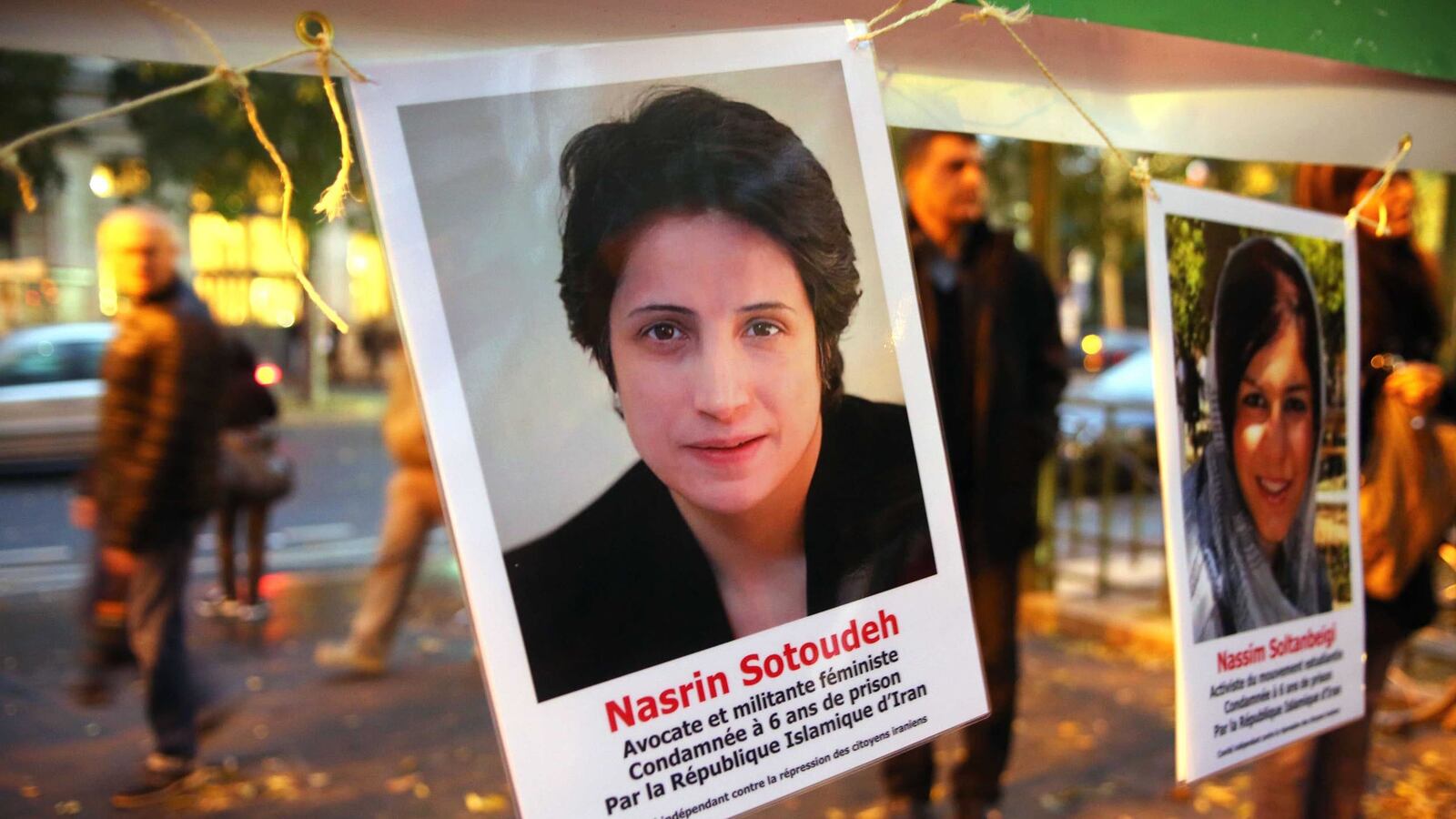A small woman in her forties stands behind a thick panel of glass. She wears dark, voluminous garments and a floral scarf tied around her head. Tapping on the glass, she merrily romps for the benefit of the man and two children on the other side of the window. The girl picks up the phone and cradles it close to her face. The woman smiles brightly and tries to divert her. The girl continues to cry.

The woman behind the glass is Nasrin Sotoudeh, a renowned Iranian human rights lawyer. The little girl is her now 13-year-old daughter Mehraveh. This scene is from a video taken during a family visit at Tehran’s Evin Prison.
Long before her arrest, Sotoudeh was a vocal proponent of children’s rights, in particular calling for an end to the Iranian government’s practice of executing minors. She was also bold enough to defend oppositionists from the Green Movement arrested after the post-election protests of 2009. In 2010, Sotoudeh was sentenced to six years on charges of “spreading propaganda” and “misusing her profession as a lawyer.” She recently launched a 49-day hunger strike from prison that gained international attention, demanding the Iranian judiciary lift a travel ban placed on her 13-year-old daughter and allow regular visitation.
“No mother should have to risk her own life to see her teenage daughter,” said Suzanne Nossel, executive director of Amnesty International USA. “It’s a relief that Nasrin has ended her hunger strike … but the appalling fact remains that Nasrin is jailed unjustly. Iran upends the rule of law when it puts a lawyer behind bars simply for representing people the authorities want to silence.”
In 2009-10, I myself spent 410 days in solitary confinement as a political hostage in Iran after being detained with my now-husband and friend near Iran’s unmarked border with Northern Iraqi Kurdistan. During that time, my bond with my mother Nora was my main source of strength. Even though they only allowed us to speak twice in more than 13 months and we only had one visit, I knew my mother would never give up fighting for my freedom on the outside and she knew I would do everything I could to stay sane and healthy inside prison.
In 2009 Sotoudeh tried to stop the execution of her child-client Arash Rahmanipour. “In this case, in order to force him to sign a false confession,” said Hadi Ghaemi, executive director of the International Campaign for Human Rights in Iran, “authorities brought his pregnant sister to the prison and threatened to hurt her if he did not admit to the false charges. These were the types of cases Nasrin handled, the same activities that landed her in prison.”
Last week, after 49 days, Iranian judicial authorities were forced to give in to the demands of Sotoudeh’s hunger strike and lift the travel ban placed on her daughter. Sotoudeh had won another victory for children’s rights, but this time it was from inside prison, not in the courts, and it was for her own child.
“They are afraid of a 13-year-old little girl speaking out on behalf of her mother. That’s why they placed the travel ban,” said Ghaemi. In Iran, authorities regularly try to intimidate the families of prisoners in order to extract false confessions or force activists to publicly renounce their work. In Sotoudeh’s case, this tactic has backfired. “Iranian authorities are paranoid that her family will leave the country to advocate for her, “Ghaemi said, “They fear Sotoudeh and therefore they fear her daughter.”
The fact that Iranian authorities didn’t let Sotoudeh die should not be mistaken for evidence of their humanity. After all, they recently let Iranian blogger Sattar Beheshti die at Evin Prison, many believe as a result of torture, and last year prisoner Hoda Saber died while on hunger strike. Iranian authorities eventually gave in to Sotoudeh because of immense internal and external pressure generated by her actions.
This attention didn’t come out of nowhere. It was the result of the determination of a global grassroots campaign, using every means at its disposal, from rallies to Tweet storms, to assert pressure on the Iranian government. Responses were heard from the United Nations, the European Parliament, and human rights organizations from around the globe. On December 2, 50 Iranian women’s rights activists gathered in front of the judiciary to present a letter to the prosecutor general. In it they asked them to release her on medical leave and warned that “any irreversible damage to the health of Nasrin Sotoudeh… will cast its shadow on you.”
“Of all the actions around the world for Nasrin, this is the one that touched me the most,” said women’s rights activist Elahe Amani. “The women who delivered it put their safety on the line. Each one made the choice to risk joining Nasrin and all Iran’s other political prisoners that day, they knew that they themselves could have been arrested. Two days after this action Iranian authorities lifted the ban.”
“They never imagined she would reach 49 days,” said Reza Khandan, Sotoudeh’s husband, who is at the center of the campaign for her release. “It was the voice of the public conscience from around the world that saved her, especially from ordinary Iranians.”
“I saw her last Tuesday,” Mr. Khandan said, “she ended her hunger strike during our visit. Nasrin had lost a lot of weight but she still had a good, happy face. She could hold the kids on her lap, but she was too weak to lift them. Nasrin never talks about her physical problems in front of the children, but she did mention a problem with her digestion and complained of dizziness.”
There’s a phrase in Farsi—“Dardet be joonam” or “Your pain to my soul”—that parents use to calm their children when they are crying. It captures the universal desire of a mother to take on the suffering of her child. “Nasrin is like other mothers, she cares a lot for her children and very much wants to be with them, but she also wants to ensure that her children live freely in the world. She’s determined to make them a better future,” said Khandan.
In a letter to her daughter Mehraveh in 2011, Sotoudeh wrote, “You were always my main motivation for pursuing children’s rights. I believe that the pain that our family and the families of my clients have had to endure over the past few years is not in vain. Justice arrives exactly at a time when most have given up hope. It arrives when we least expect it. I am certain of it.”





